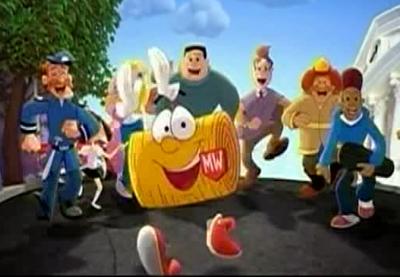I used to go to Calgary Cannons baseball games. During the seventh-inning stretch, a bunch of 16-year-old boys and girls would get onstage and lead the crowd through the movements of “YMCA” by the Village People.
This always fascinated me. Here were young athletes dancing and lip-synching to a campy gay anthem celebrating a popular hookup spot. While elsewhere in town, jocks were bullying and bashing queers, these ones were enthusiastically embracing gay culture.
Well, not quite. It turns out, of course, that 99 percent of the people stretching to “YMCA” in baseball stadiums all over North America have no idea it was originally a gay song – even when they’re singing:
They have everything for you men to enjoy,
You can hang out with all the boys …
A couple of years later, I saw a magazine ad for some regional chapter of the Certified Management Accountants. Under the headline “Why CMA?” was a photo of four business-suited accountants spelling out the letters with their bodies, just like in the song “YMCA.” I found this even more fascinating, since marketers usually try to avoid any whiff of controversy. But here, in an attempt to position accountants as creative and human, they were being associated with gay culture and, to a lesser extent, Christianity (it is, after all, the Young Men’s Christian Association). Clearly, the advertiser was confident its audience was blissfully unaware of either connotation.
Which brings me to the current TV commercial for Kellogg’s Mini-Wheats. We see an animated Mini-Wheat character with a cast of townspeople – including a fireman, policeman, farmer, businessman and skater dude – singing about whole wheat and sugar frosting. All pretty saccharine stuff, except the melody they’re singing to is “In the Navy” by, you guessed it, the Village People.
This one’s especially noteworthy in that, aside from the music, the ad seems to deliberately echo the uniform-fetishizing of the Village People’s campy gay stereotypes. Yet everything is sanitized and Disney-fied, so moms, dads and tots can be attracted to the fun-loving characters and infectiously familiar melody, without being aware of the original song’s lyrics:
They want you, they want you,
They want you as a new recruit
And …
They’re signing up new seamen fast
Here we have mainstream culture seemingly embracing two songs that fondly poke fun at institutions where, historically, gay men could covertly meet. Even the veiled references to recruitment of young men – that cherished hot button of the Christian right – don’t diminish the songs’ popularity.
Which is fine, except it’s not really gay culture that’s being embraced. It’s a neutered and declawed facsimile of gay culture. The songs’ implied messages of free love, acceptance and empowerment are either ignored or deleted. So all that’s actually being embraced is the toe-tapping melody and smiley-faced dance steps.
Of course, some people might say that the mainstreaming of gay culture is a sign that we’re becoming equal participants in the broader society. Our culture is everyone’s culture. We’re just like everyone else. And there’s no denying that seeing ourselves reflected back when we look at popular culture – even if we’re the only ones who know we’re being reflected – can feel kind of good.
But in reality, what superficial mainstreaming does is homogenize us until we’re once again invisible. Having our icons appropriated and stripped of all meaning to sell breakfast cereal and bookkeeping doesn’t make the masses think more positively about us, because they’re not thinking about us at all. So we remain safely out of sight, behind the door of a sugar-coated closet.

 Why you can trust Xtra
Why you can trust Xtra


